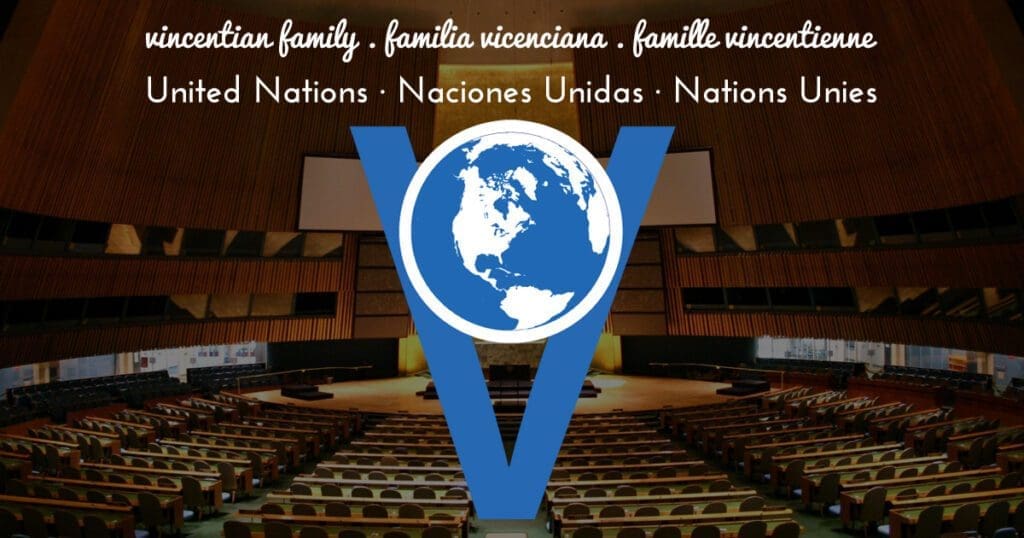Working on a variety of important issues through UN NGO committees has taught me several critical lessons, the most instructive of which is how addressing problems from a multi-stakeholder perspective can yield more positive outcomes. Why is this, and how is it particularly Vincentian?
Collaboration with our brothers and sisters within our own branch of the Vincentian family, and across branches, enhances our knowledge, provides opportunities for growing our mission, and instills courage to make good decisions as a team that otherwise might feel daunting on our own. This is the beauty of the gatherings of the Vincentian Family at the U.N., where we devote time at each meeting to learn about the various NGO committees of the U.N. on which we serve, and the ongoing work within our branch of the Vincentian Family tree. Further to the point, working across NGO committees and sharing our progress affords insights into the overlapping areas each committee is seeking to address, and opens up avenues of dialogue that invite diverse viewpoints, ultimately optimizing our impact. Finally, creating side events at the U.N. that invite a multi-stakeholder perspective creates an intersecting space for NGOs, member states, and the private sector to realize mutually beneficial goals and to identify obstacles to obtaining them that we can tackle together.
The challenges we face moving forward to the Second World Summit for Social Development in the State of Qatar next November 2025, are being examined in preparatory meetings for the summit, engaging stakeholders across society’s sectors to better understand what is working and what is not working. These challenges send out a clarion call for multi-stakeholder methodologies. U.N. Secretary-General António Guterres sees this summit as “an opportunity to hold a different form of global deliberation and to live up to the values, including trust and listening, that underpin the social contract”, which speaks directly to the importance of multi-stakeholder engagement. He states that “the Summit outcome could be an update of the 1995 Copenhagen Declaration on Social Development, covering issues such as universal social protection floors, including universal health coverage, adequate housing, education for all and decent work, and give momentum towards achieving the Sustainable Development Goals.” These issues affect all communities and are particularly important for those marginalized by discriminatory policies that advantage dominant social groups.
While agreement around the SDGs was universal, adopted by all 193 U.N. member countries in 2015, and with goals established through a rigorous multi-stakeholder engagement process, thus far goal attainment has struggled to meet expected targets. Uneven progress on realizing the SDGs is apparent “across regions, between sexes and among people of different ages, wealth and locales, including urban and rural dwellers” (Nonet, et al., 2022, p. 950). Severe poverty persists, environmental calamities abound, women and girls continue to suffer abuse and lack access to basic educational and financial resources, and digital and physical infrastructure remains scarce in some of the world’s poorest economies. The importance of dialogue and collaboration in cross-sector partnerships is indisputable in addressing these issues and can serve as a facilitator of progress across the SDGs, even while we acknowledge that successful implementation is highly context-dependent (see case study in Ethiopia described in Segaro and Haag, 2022). Yet challenges to creating effective multi-stakeholder networks, while not insurmountable, can prove formidable, especially when stakeholder power, voice and access are in imbalance, advantaging the “haves” over the “have-nots” in almost every scenario.
Our time for joining hands in solidarity with those whose voices are too often dominated by a powerful few is now. We have in our grasp the ability, willingness and wherewithal to model behavior for a new era of cooperation, seeking partnerships that can advance the Vincentian mission in a world that has grown increasingly individualistic. Never has this been more needed. We unite in prayer for more equitable distribution of benefits and burdens and seek support from like-minded stakeholders across public, private and not-for-profit sectors to become principle-based partners in inviting more participatory decision-making and full representation at the table, as we engage in discourse on achieving our sustainability agenda. “Love one another, bear with one another, support one another and be united in the Spirit of God who has chosen you for this great undertaking and will preserve you for its fulfillment” — St. Vincent de Paul (CCD V:441)
References
Nonet, G. A. H., Gössling, T., Van Tulder, R., & Bryson, J. M. (2022). Multi-stakeholder engagement for the sustainable development goals: Introduction to the special issue. Journal of Business Ethics, 180(4), 945-957.
Segaro, E. L., & Haag, K. (2022). Good Intentions Gone Awry: Government Intervention and Multistakeholder Engagement in a Frontier Market. Journal of Business Ethics, 180(4), 1019-1040.
Linda Sama, Ph.D.
NGO Representative at the UN
International Association of Charities (AIC)






Excellent as usual, Linda, thank you. Collaboration is the only way forward, and it demands that we try to understand the issues from multiple perspectives.